Brazil’s LGBT community vows resistance to ‘proud homophobe’ Jair Bolsonaro
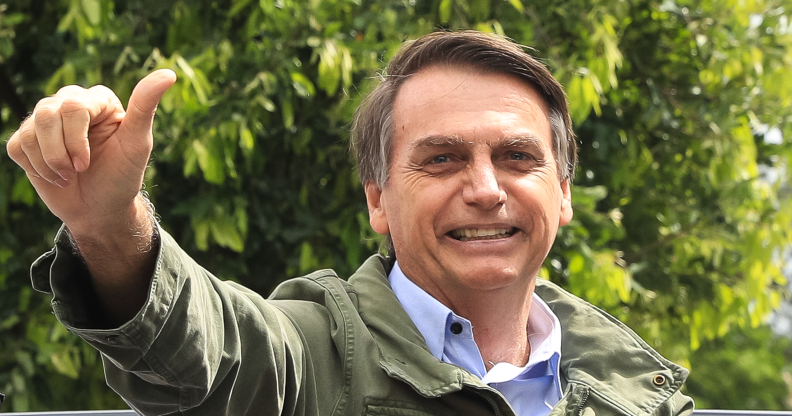
Jair Bolsonaro will take office in January (Buda Mendes/Getty)
Brazil’s LGBT+ community is fighting back after the election of far-right ‘proud homophobe’ Jair Bolsonaro.
Messages of support have flooded social media after the demagogue, who has said he would be “incapable of loving a gay son” and would “prefer that he die in an accident,” won 55 percent of the vote on Sunday (October 28) to beat leftist opponent Fernando Haddad and become President.
Pabllo Vittar, a drag queen and singer who has collaborated with stars like Major Lazer and Charli XCX, posted a rainbow to Instagram, with the caption: “I resist.”
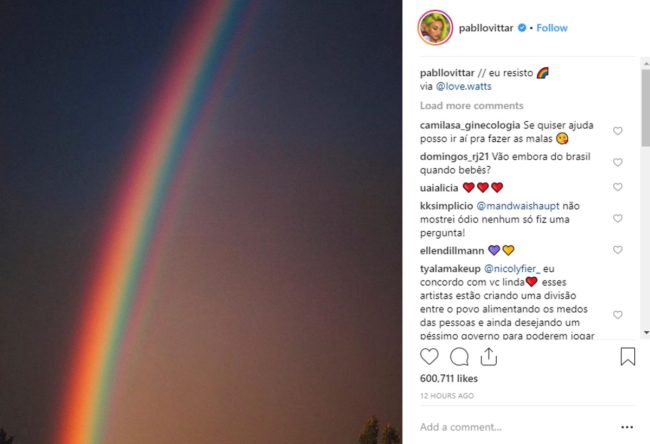
“I resist” (pabllovittar/instagram)
Just as it was after the election of President Donald Trump in the US, “resist” has been a popular rallying cry, as has “Ele Nao E Meu Presidente,” which means: ‘He is not my president.’
Other posts reimagine the country’s flag as a rainbow one, featuring the words “proteja seus amigos”—’protect your friends’—as a reference to those groups such as women, indigenous people, asylum seekers who have previously been the target of Bolsonaro’s aggressive rhetoric.
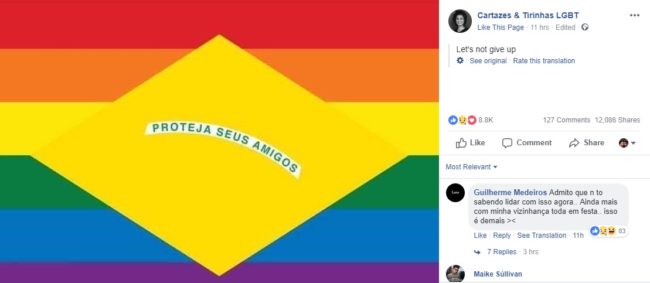
A popular queer page in Brazil is one of many to share this image (Cartazes & Tirinhas LGBT/facebook)
The phrases “ninguém solta a mao de ninguém” and “no nos soltaremos las manos”—which both roughly translate to ‘we will not let go of each other’s hands’—have also been circulating to urge intersectional solidarity in the face of hatred.
José Miguel Vivanco, Human Rights Watch’s director of the Americas, said: “Brazil has independent judges, dedicated prosecutors and public defenders, courageous journalists and a vibrant civil society.
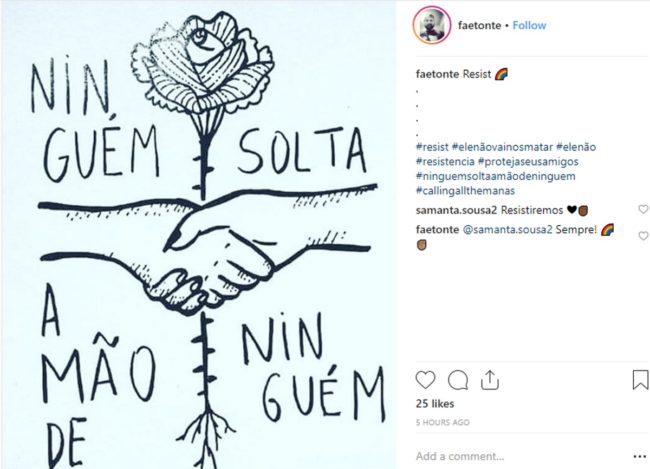
“We will not let go of each other’s hands” (faetonte/instagram)
“Human Rights Watch will join them in resisting any attempt to erode the rights and democratic institutions that Brazil has built with so much effort over the past three decades.”
Amnesty International’s Americas director, Erika Guevara-Rosas, said: “The president-elect has campaigned with an openly anti-human-rights agenda and frequently made discriminatory statements about different groups of society.
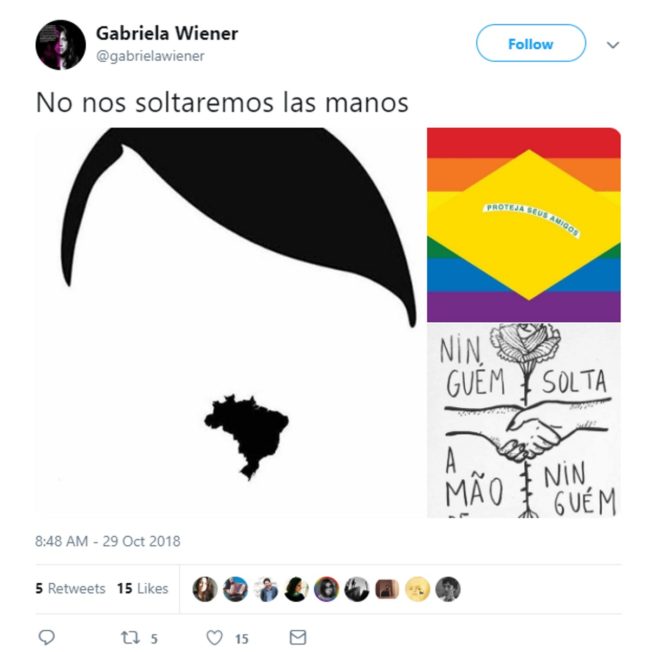
Some of the most popular shared images on Brazilian social media, including one which compares Bolsonaro to Adolf Hitler (gabrielawiener/twitter)
“His election as Brazil´s president could pose a huge risk to Indigenous Peoples and quilombolas, traditional rural communities, LGBTI people, black youth, women, activists and civil society organisations, if his rhetoric is transformed in public policy.
“With the electoral process now over, we all face the challenge of protecting human rights for everyone in Brazil.”
As of mid-September, more than 300 people had been killed in anti-LGBT hate crimes so far this year, meaning that 2018 was on track to be the country’s deadliest ever year on record for queer people, after there were 387 LGBT+ murder victims in 2017 and a total of 343 the year before.
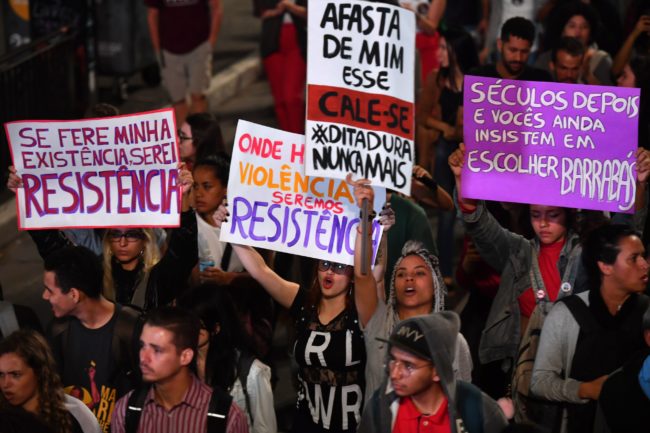
A protest against Bolsonaro before the second round of voting (NELSON ALMEIDA/AFP/Getty)
This was before the “frightening” spike in abuse and attacks that Brazilian LGBT+ activists described to The Guardian in a recent article.
Campaigner Beto de Jesus, who founded the annual Pride parade in São Paulo which this year attracted three million people, also told the publication: “It’s as if the gates of hell have been opened – as if hunting season had been declared.
“It’s barbarism.”
Bolsonaro has a long history of anti-gay comments, once commenting: “Yes, I’m homophobic – and very proud of it.”
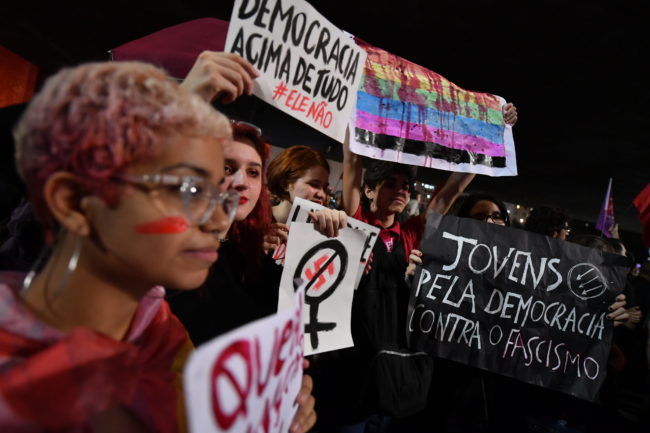
Bolsonaro once said: “Yes, I’m homophobic – and very proud of it” (NELSON ALMEIDA/AFP/Getty)
Earlier this year, he reiterated his promise to punch two men in the street if he saw them kissing.
The President-elect, who served as an army captain under Brazil’s brutal 21-year-long dictatorship, also said in 2015 that hospital patients should be allowed to reject ‘gay blood.’
In 2013, during an interview with British actor and activist Stephen Fry, Bolsonaro said campaigners calling for LGBT+ equality “want to reach our children in order to turn the children into gay adults to satisfy their sexuality in the future.”
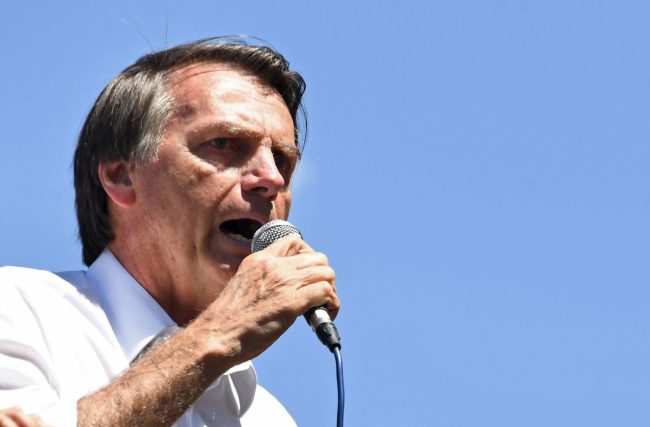
He has said there are “fundamentalist homosexual groups that are trying to take over society” (EVARISTO SA/AFP/Getty)
Renan Quinalha, a São Paulo-based lawyer and LGBT activist, however said the LGBT+ community would not wave the white flag in the face of this hateful rhetoric. “Our role will be to support the resistance, fight and protect each other,” he wrote on Twitter, adding: “We are over 45% of the country’s voters. We will be more and more each time and we can form a huge resistance movement.”

